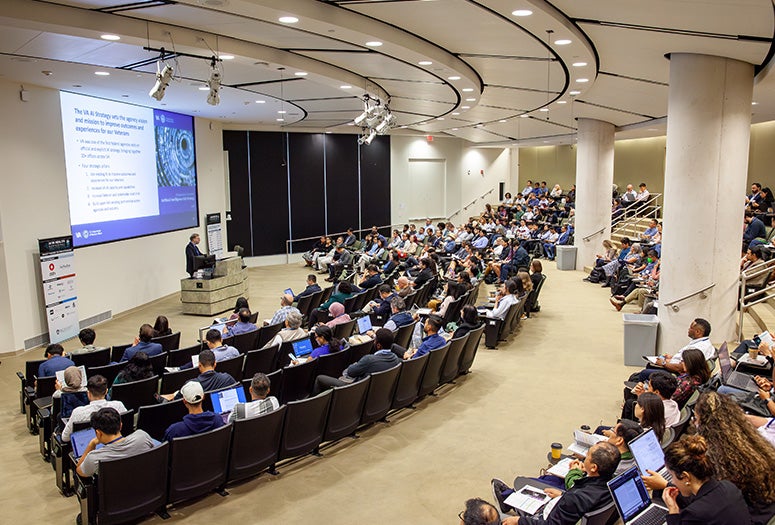by Kelly Peters
Special to Rice News
Rice University’s Ken Kennedy Institute hosted the third annual AI in Health Conference Sept. 9-12, welcoming over 470 participants to Houston to explore the latest advancements in artificial intelligence.

The forum brought together researchers and practitioners at a significant time for AI development as highlighted most recently by the U.S. House Committee on Science, Space and Technology passing nine bills pertaining to AI into law just last week, emphasizing a national commitment to enhancing AI safety, trustworthiness, education and training and usability.
The event helped reinforce both the transformative potential of AI and the need for continued regulatory guidance on its deployment in health care, where rapidly evolving applications intersect with concerns in transparency and reliability. While addressing attendees at the start of the conference, Rice President Reginald DesRoches and Lydia Kavraki, professor of computer science and director of the Ken Kennedy Institute, underscored the importance of responsible AI implementations in health care to impact providers and patients at the global scale.
DesRoches kicked off the conference, remarking that it “provides an opportunity not only to discuss and celebrate the remarkable strides made but also to pose the questions that AI researchers and AI innovators will need to address for the next wave of breakthroughs — and the waves beyond — that will lead us toward a healthier, more equitable future for all.”

“AI has the potential to revolutionize health in ways we could scarcely imagine a decade ago, from improving diagnostic accuracy and treatment personalization to optimizing hospital operations and supporting public health initiatives such as disease surveillance and prevention,” Kavraki added.
Since its launch in 2022, the AI in Health Conference has become a vibrant forum for engaging experts in academia, medicine and industry. The annual conference takes place at the Bioscience Research Collaborative in Houston — a facility that bridges the Rice campus with the world’s largest medical center to foster interdisciplinary and interinstitutional innovation. This year the conference program committee included 23 members from the Texas Medical Center (TMC) and local industry and was chaired by Ben Hu, associate professor of computer science at Rice.

Many TMC institutions were represented in the program lineup along with presenters from the National Institutes of Health “All of Us” Research Program, the U.S. Department of Veterans Affairs, the Cancer Prevention and Research Institute of Texas, Yale University, Georgia Institute of Technology, Emory University and the University of Texas at Austin, among many others. The program also featured 17 lightning talks and over 70 poster presenters.
The conference explored a variety of AI systems, applications and foundational models in neuroscience and neurotechnology, imaging and diagnostics, patient interaction and behavioral health and bioinformatics and genetic analysis. Sessions also highlighted ethical considerations and challenges of implementation such as data privacy, model bias and error detection.
“It is essential that we thoughtfully navigate these complexities. This conference provides a platform for leading minds to engage in shaping the future of AI in health,” Kavraki said.

The Ken Kennedy Institute also collaborated with the Institute for Data Science in Oncology at MD Anderson, NVIDIA and Mark III Systems and Rice’s Medical Humanities Research Institute to provide opportunities for extended learning, offering specialized workshops that examined implications of AI on health equity and an understanding of computational tools used for disease prediction, diagnosis and treatment.
As research amplifies translational AI innovation in health, it becomes increasingly vital to make space for ongoing dialogue and critical evaluation of technology — and the policy that governs it — to improve real-world health outcomes.
Recordings from the conference are now available on the Ken Kennedy Institute YouTube Channel.
The next AI in Health Conference is scheduled to take place in Houston Sept. 22-25, 2025.

